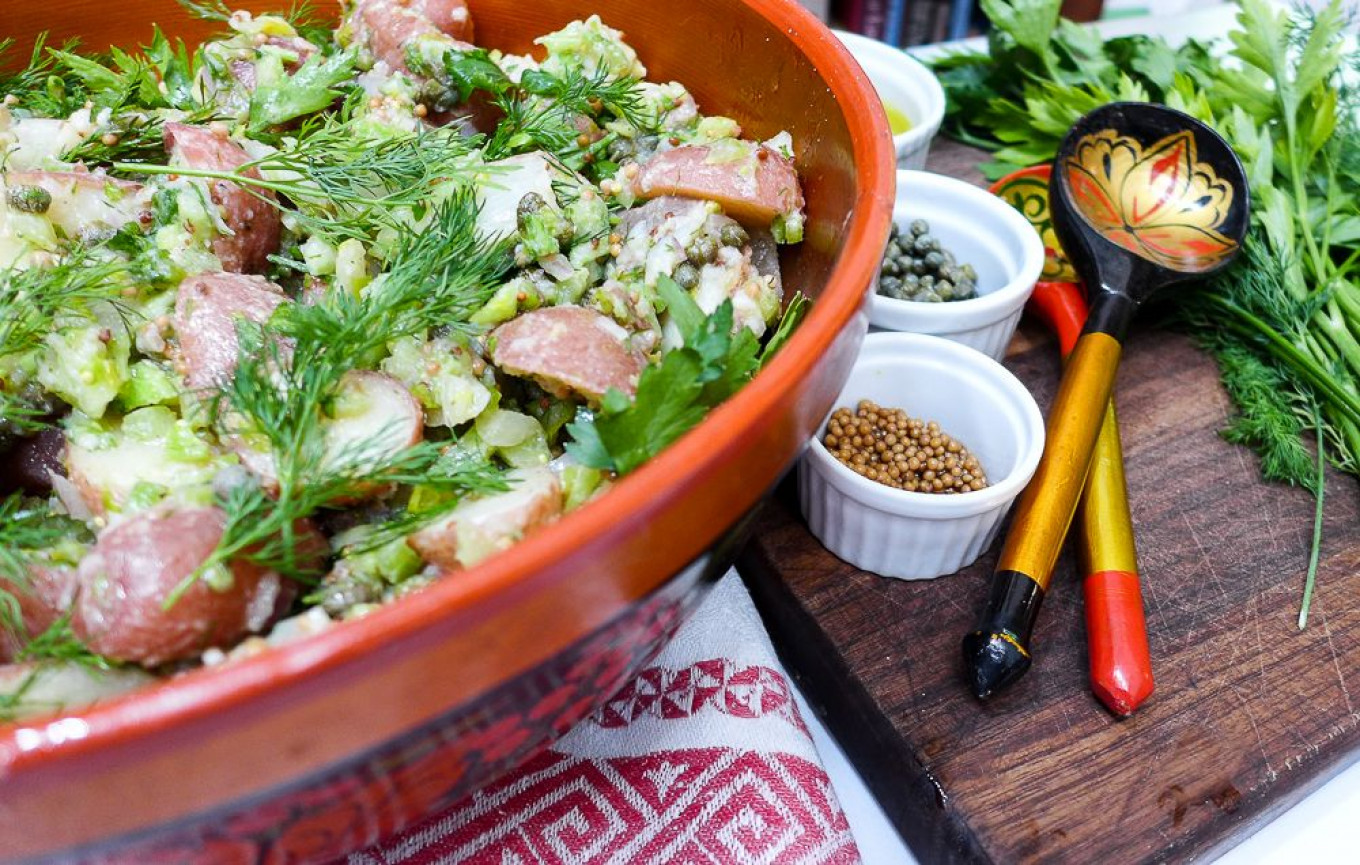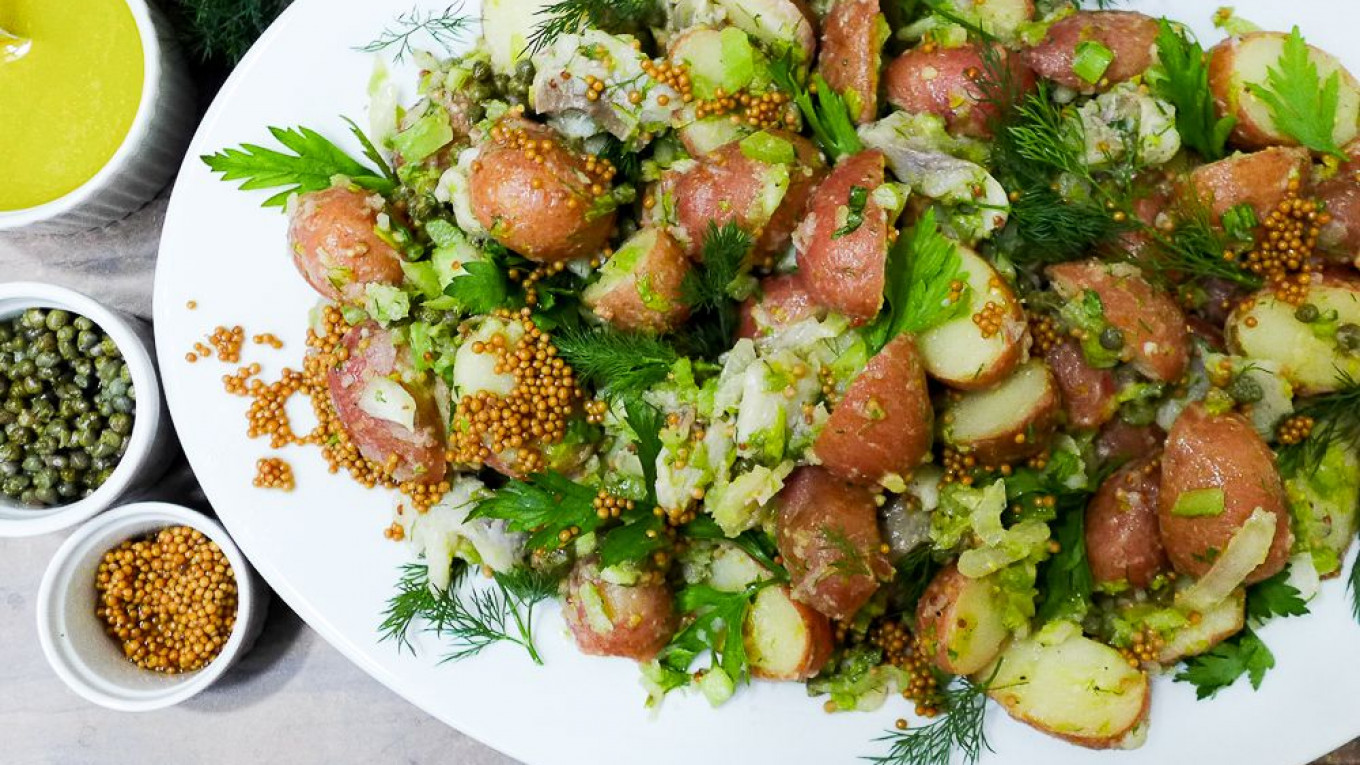When I think about Russian pantry staples, my mind automatically pivots to images of hearty grains such as buckwheat or hardy root vegetables like beets. But a crucial staple throughout Russia’s lengthy history has always been fish. Russians became creative experts in finding ways to preserve fish, as anyone who has enjoyed a lavish zakuska table can attest. Whether dried, salted, smoked, cured, or pickled, fish provided much needed protein and omega fatty acids throughout the long Russian winters, and today preserved fish is a firm part of Russian cuisine.
Herring runs through Baltic history like a slippery, silvery-blue ribbon, a pillar of the economy just as it was a lifeblood to the region’s poorest. Nations rose and fell on the strength of the herring trade, which reached an annual fever pitch in the Middle Ages at the autumn Skåne Market in Denmark, a fixture of the annual calendar of the Hanseatic League, a confederation of merchant guilds and market towns in Northwestern and Central Europe. This confederation of merchant cities such as Lubeck, Riga, Bremen, and Hamburg dominated the flow of goods from thirteenth well into the seventeenth century.
Fish was plentiful in the Baltic, and in high demand in the Middle Ages thanks to the Catholic liturgical fasts, which mandated regular abstinence from meat. Herring travel in shoals, and before the nineteenth century these shoals were so plentiful and crowded that Peter the Great once remarked that, “if you push an oar in the water, it stands up by itself — the shoals of herring are so thick.” But until the 14th century, herring was seasonal fare that was too oily to be dried and then salted as was the ubiquitous cod. The invention in 1386 of the method called “gibbing” by Dutchman, Willem Beukelszoon changed the herring market forever.
Beukelszoon discovered that by removing the gills and gullet of the fish, he could preserve the fish in a 1:20 ratio of salt to herring. Northern Europe’s insatiable demand for fish all year round got an invaluable addition, and “soused herring” traveled around the Baltic from the Hansa “kontor” (trading post) in Novgorod all the way to its headquarters in London and as far as Madrid.
The ability to preserve herring bolstered many ancillary trades, including shipbuilding, barrel making, and the lucrative salt trade from Luneburg. Gibbing was to change the balance of economic power in the Baltic, as the Low Countries launched a slow but steady challenge the unbreakable monopoly of the Hansa.
Beukelszoon had done his country a great service — an impressive statue to his memory was erected a few centuries later by Emperor Charles V, when Amsterdam was the center of a worldwide colonial enterprise. Amsterdammers readily admit that their city is built on herring bones, a fact celebrated each National Day with a fresh herring fillet accompanied by raw onions. This is just one way that herring is enjoyed in the region. Throughout the Baltic, soused herring is a staple part of the diet, combined with combinations of raw onion, egg, sour cream, yogurt, honey, peppercorns, and dill.
Peter the Great’s passion for everything Dutch may have added to the popularity of soused herring, which comes into its own each New Year in Russia in the form of the molded salad known as Herring Under Fur Coat. After Peter’s conquest of the Eastern Baltic in The Northern War at the beginning of the eighteenth century, Russia controlled key herring ports such as Riga and Tallinn, ensuring a steady flow of the Baltic’s signature fish to this day. Stroll through any Russian grocery store and the many varieties of pickled and preserved herring testifies to herring’s popularity.
Herring has a full-bodied flavor that provokes extreme reactions: people either love or hate it. This specific taste, combined with the piquant tang of the sour marinade, cries out for a more neutral base to contrast it, traditionally — boiled potatoes. Marinated vegetables such as onions and cucumbers add other flavors that march well with herring, and a contrasting crunch to the velvety texture of the herring and softness of the potatoes.
The traditional — or rather classic — way to enjoy these complimentary flavors is to open yesterday’s Izvestia, spread it out on your kitchen table and arrange the ingredients on top of the newspaper. Invite a friend and open a bottle of vodka. A little Vladimir Vysotsky in the background completes the experience.
But we don’t want to encourage too much of this kind of behavior — not during a health crisis anyway — so here is a salad that combines the various ingredients used around the Baltic littoral to compliment herring, including fresh spring and summer herbs for added crunch and zing.
Hansa Herring Salad can do stellar service as a main course or hold its own as a side and makes the perfect contribution to a picnic or potluck, when social becomes irrelevant. To keep the salad light, there are no hard-boiled eggs, but you can add them if you wish. Or think about topping the salad with a fried or poached egg.
The fundamental technique here is allowing time for the potatoes to absorb the dressing — a good two or even three hours is optimal. Be sure to do this before adding the fresh herbs and onions to keep their crunch intact. Get creative with your fresh herbs: dill will always play nicely with herring, but so too will parsley, lovage, basil, and chives. Serve the salad at room temperature… with the vodka and Vysotsky, obviously.

Hansa Herring Salad
Ingredients
For the Salad
- 1 cup (240 ml) olive oil
- Juice and zest of 2 lemons
- 2 Tbsp brine from the herring jar
- 2 tsp sea salt
- 2 Tbsp Dijon Mustard
- 1 Tbsp Whole Grain Mustard
- Freshly ground black pepper
- 1 ½ cups (354 ml) pickled herring
- 2 lb. (1 kilo) new potatoes (the smaller, the better!) sliced in half
- ⅔ cup capers (150 ml) drained
- 4 celery ribs (and leaves) chopped in a fine dice
- 4 Tbsp fresh-chopped dill
- 1 small shallot, finely minced
- 1 bunch parsley, finely chopped
- Snipped chives
For the Pickled Mustard Seeds
Ingredients
- ½ cup (120 ml) whole mustard seeds
- 1 cup (240 ml) apple cider vinegar
- 3 Tbsp coarse sea salt
- 2 Tbsp brown sugar
Instructions
Make the Pickled Mustard Seeds
- Place the mustard seeds, vinegar, brown sugar and coarse sea salt into a saucepan with a lid.
- Bring to a boil, then lower the heat and simmer for one hour until the seeds have doubled in size.
- Decant the seeds with the remaining liquid into a clean glass jar and allow to come to room temperature before refrigerating.
Make the Salad
- Bring a pot of salted water to boil, then add the potatoes. Simmer for 6-7 minutes until the tip of a sharp knife goes in smoothly.
- Zest the lemons, then juice them.
- While the potatoes are cooking, whisk together the olive oil, lemon juice, zest, brine, mustard, salt, and pepper.
- Tip the potatoes into a large bowl, then toss gently with three-quarters of the dressing mixture, setting aside the remainder. The potatoes will absorb the dressing as they come to room temperature. Let them sit for at least 2 hours until the potatoes come to room temperature and have absorbed the dressing
- Slice the herring.
- Drain the herring and toss with the potatoes, celery and shallot. Taste and adjust seasonings with the salt and pepper as needed (the herring is very salty, so don’t add the salt until all the ingredients are combined). Add some of the retained dressing if needed.
- Arrange on a platter. Spoon the pickled mustard seeds on top and garnish with freshly chopped dill and parsley. Serve at room temperature.
A Message from The Moscow Times:
Dear readers,
We are facing unprecedented challenges. Russia's Prosecutor General's Office has designated The Moscow Times as an "undesirable" organization, criminalizing our work and putting our staff at risk of prosecution. This follows our earlier unjust labeling as a "foreign agent."
These actions are direct attempts to silence independent journalism in Russia. The authorities claim our work "discredits the decisions of the Russian leadership." We see things differently: we strive to provide accurate, unbiased reporting on Russia.
We, the journalists of The Moscow Times, refuse to be silenced. But to continue our work, we need your help.
Your support, no matter how small, makes a world of difference. If you can, please support us monthly starting from just $2. It's quick to set up, and every contribution makes a significant impact.
By supporting The Moscow Times, you're defending open, independent journalism in the face of repression. Thank you for standing with us.
Remind me later.







